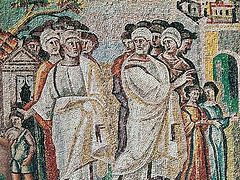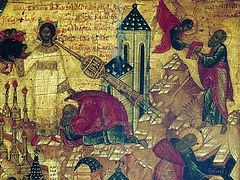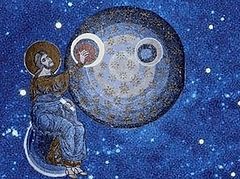Talk 11. Be Not Conformed to This World…
We continue our study of the first book of Sacred Scripture—Genesis.
In the previous conversation, we looked at the fourteenth chapter, which speaks of the imprudence of Lot who ignored the advice of Abram, his being taken into captivity, his liberation by Abram, and Abram’s unwillingness to be dependent on the king of Sodom and Gomorrah when he wanted to thank him for his release from captivity: And Abram said to the king of Sodom, I have lift up mine hand unto the Lord, the most high God, the possessor of Heaven and earth, That I will not take from a thread even to a shoelatchet, and that I will not take any thing that is thine, lest thou shouldest say, I have made Abram rich (Gen. 14:22-23). We also find the first type of the Holy Eucharist in the fourteenth chapter, when the king of Salem—Melchizedek—comes out to meet Abram and presents him with bread and wine. Abram receives the gifts and thanks Melchizedek, dividing out to him a tenth of his property.
So, let’s move on to examining chapter 15. The fifteenth chapter begins with the words:
After these things the word of the LORD came unto Abram in a vision, saying, Fear not, Abram: I am thy shield, and thy exceeding great reward (Gen. 15:1).
According to St. John Chrysostom, with these words God comforts Abram, who refused to accept riches from the hands of the profligate king, promising protection and a reward to those who hope in Him. “I am your shield. This saying is quite significant. I, Who raised you up from the land of the Chaldeans; I, Who led you here; I, Who freed you from the dangers in Egypt; I, Who several times promised to give you and your seed this land—I protect you. I, Who glorify you more and more every day before all—I protect you; that is, I fight for you. I conquer for you, I look after you, and I make all difficult things light for you.”
St. Ambrose of Milan specifies: “Abram did not seek a reward from man, therefore he received it from God.”
The search for glory, prosperity, and reward is, in general, the normal state of the human soul, which, according to the ecclesiastical teacher Tertullian, is “by nature Christian” and strives to acquire this. Whether this good will be a true good for someone depends on the aspiration of the soul: in whom and from whom it seeks prosperity, reward, and glory—that’s where it will receive them. If from God, then: Them that honor Me I will honor (1 Kg./1 Sam. 2:30). If God wants to honor us, who can stop Him? St. Maximus the Confessor writes the following: “God and I—this is already a majority, and an overwhelming one at that.” But if a man seeks rewards and glory from man, in this case, St. Isaac the Syrian warns: “Those who seek honor for themselves will not be lacking in sorrow.” To put it simply, he will suffer a hard fall.
Abram seeks protection and glory from God, and the Lord confirms and strengthens him in faith and hope for the great posterity and inheritance that will come from him.
And He brought him forth abroad, and said, Look now toward Heaven, and tell the stars, if thou be able to number them: and He said unto him, So shall thy seed be (Gen. 15:5).
What do the words, and He brought him forth abroad mean? asks St. Ambrose of Milan. And he answers: “The prophet is brought out, as it were, that he might come out of the body and see the limitations of the flesh covering him… and it’s like a kind of descent of the Holy Spirit. And we also must come out of this limitation of our bodily shelter, purify the dwelling of our soul of all uncleanness, and spew forth the filth of hostility, if we want to receive the spirit of wisdom, because wisdom will not enter into an evil soul (Wis. 1:4). Abram believed, not being deceived by gold and silver, but he believed in righteousness with his heart. He whose merit was tested, the same received a reward.”
Let us read on: And Abram believed in the LORD; and He counted it to him for righteousness (Gen. 15:6).
“So, let us also learn from the forefather to believe the words of God and trust in His promises,” St. John Chrysostom instructs, “and not explore them according to our own ideas.” This is a very important note to heed: “not explore them according to our own ideas.” How often in our religious life we neglect this advice in the matter of our salvation. We seek God with our own ideas, in our own fantasies and reflections on the providence of God. And relying on our own mind, having made some mistakes and taken our lumps, we then ask: “What for, Lord?” The answer is simple—for our distrust in God. To believe means to love and trust Him, to act on His advice, drawn from the Holy Scriptures and Church Tradition. Faith cometh by hearing, and hearing by the word of God (Rom. 10:17), and the word of God, according to the Psalmist David, is a lamp unto my feet (Ps. 118:105). It’s no wonder that in walking without light in the darkness of this age, relying on ourselves and confusing faith with self-confidence, hope with arrogance, love for God and man with self-love, we cripple ourselves and others with our egotism.
Every day we read the Lord’s Prayer with the words “Thy will be done,” but then we act according to our own vision and will. The Russian philosopher Vladimir Soloviev says: “You don’t have to apply your own mind’s yardstick to everything,” especially as concerns the providence of God. In the hagiographic literature, there is the story of how a monk asked God in prayer about His providence:
One ascetic, seeing the unrighteousness existing in the world, prayed to God and asked Him to reveal to him why righteous and pious people come upon hard times and suffer unfairly, while the unrighteous and sinful are enriched and live in peace.
When the ascetic prayed for the revelation of this mystery, he heard a voice that said:
“Don’t test that which your mind and the power of your knowledge can’t attain. And don’t seek out that which is hidden, because the judgments of God are an abyss. But since you asked to find out, go down into the world and sit in one place and give heed to what you see, and you will understand a small part of the judgments of God. Then you will know that God’s care for souls in all things is unsearchable and incomprehensible.”
Having heard this, the elder cautiously went down into the world, to a meadow with a road passing through it. There was a spring and an old tree nearby, and the elder hid in the hollow of the tree.
Soon a rich man rode up on a horse and stopped by the spring to have a drink and rest for a bit. When he had well drunk, he took a purse with a hundred ducats out of his pocket and started counting them. Then he meant to put them back, but didn’t notice that the purse fell out onto the grass. He ate, rested, slept, and then, getting on his horse, he rode off, unaware about the ducats. Soon another passerby came to the spring, found the purse with the ducats, and took it and ran off across the fields. Some time passed, and another passerby appeared. Being tired, he also stopped at the spring, took some water, took out a piece of bread from his handkerchief, and sat down to eat. While the poor man was eating, the rich man on a horse appeared, and, infuriated and with a face full of anger, attacked the man. He furiously shouted for the man to give him his ducats. Having no idea about the ducats, the poor man swore an oath that he hadn’t seen them. But being in such a rage, the rich man started whipping and beating the man, until finally he died. He scoured the poor man’s clothes but found nothing and left disappointed.
The elder was shocked, having seen everything from the tree. He pitied and wept for the unjust murder and prayed to the Lord, saying:
“Lord, what is the meaning of this will of Thine? Tell me, I pray Thee, how Thy goodness can tolerate such unrighteousness. One lost the ducats, another found them, and another was killed unjustly.”
While the elder was tearfully praying, an angel of the Lord descended and said to him:
“Don’t be grieved, elder, and don’t think out of discontent that this supposedly happened without the will of God. But of that which happened, one was by permission, another for punishment (education), and another by economia. So, listen: He who lost the ducats is the neighbor of he who found them. The latter had a garden worth a hundred ducats. The rich man, being very greedy, forced him to give him the garden for fifty ducats. The poor man, not knowing what to do, asked God for vengeance. Therefore, God arranged for him to be recompensed twice over. The other poor man, exhausted, who found nothing and was killed unjustly, once committed a murder himself. However, he sincerely repented and spent the rest of his life in a Christian and God-pleasing manner. He constantly asked God to forgive him for the murder and would say: ‘My God, grant me the same death that I inflicted upon another!’ Of course, our Lord already forgave him from the moment he showed repentance. Moreover, he not only concerned himself with keeping His commandments out of piety, but even wanted to pay for his old guilt. Thus, having heard him, He granted him to die violently—as he had entreated Him—and took him to Himself, even granting him a radiant crown for his piety! Finally, the other, the greedy man, who lost the ducats and committed murder, was punished for his covetousness and love of money. God allowed him to fall into the sin of murder so his soul would become ill and come to repentance. For this reason, he’s now leaving the world and going to become a monk! So, where in this case do you see that God was unrighteous, or cruel, or merciless? Therefore, in the future, test not the judgments of God, for He works them justly and as He knows, while you consider them to be unjust. You should also know that many other things are done in the world according to the will of God for reasons that people don’t know.”
Thus, it is correct to say: Righteous art Thou, O Lord, and upright are Thy judgments (Ps. 118:137). The book of Deuteronomy says: The secret things belong unto the LORD our God: but those things which are revealed belong unto us and to our children for ever, that we may do all the words of this law (Deut. 29:29). Abram believes in God, not doubting in His providence.
And Genesis goes on to say that God commands Abram to make a sacrifice.
And He said unto him, I am the Lord that brought thee out of Ur of the Chaldees, to give thee this land to inherit it. And he said, LORD God, whereby shall I know that I shall inherit it? And He said unto him, Take me an heifer of three years old, and a she goat of three years old, and a ram of three years old, and a turtledove, and a young pigeon. And he took unto him all these, and divided them in the midst, and laid each piece one against another: but the birds divided he not. And when the fowls came down upon the carcases, Abram drove them away (Gen. 15:7-11).
What is the meaning of this sacrifice of divided animals and the birds flocking to their carcasses? The sundering of Abram’s sacrifice symbolizes the sinful, severed state of man, irreconcilable with God. “Therefore it is said: Only the birds I did not dissect, showing that there is a division between the carnal, while the spiritual are inseparable” (Blessed Augustine).
Verse 11 is interesting. The King James Version, as we have read, says: And when the fowls came down upon the carcases, Abram drove them away. The Greek Septuagint reads: κατέβη δὲ ὄρνεα ἐπὶ τὰσώματα, τὰ διχοτομήματα αὐτῶν, καὶ συνεκάθισεν αὐτοῖς Αβραμ, which literally translates as: And birds came down upon the bodies (σώματα), even upon the divided parts of them, and Abram sat down by them. He sat down (συνεκάθισεν) with them, and he drove them away—these are contradictory concepts. Animal sacrifice points to the sacrifice of Christ. And again, the word σώματα, “body,” points to the Body of Christ. Thus it becomes clear why Abram sat down among them. This points to the Eucharist and the inheritance of the Kingdom of Christ. When the Disciples asked Christ about the end of the age and who would be saved, He answered them: For wheresoever the carcase (body, σώματα) is, there will the eagles be gathered together (Mt. 24:28, cf. Lk. 17:37).
Blessed Theophylact of Bulgaria gives the following interpretation:
“And as rapacious eagles immediately flock to the corpse, so where Christ will be, all the saints will come, soaring on the height of virtue; they, like eagles, will ascend to the clouds. The corpse here means Christ, as He died.”
And the fifteenth chapter ends with a prophecy of the 430-year captivity of the Israelite people in Egypt, which will be fulfilled as described in detail in the book of Exodus.
To end today’s discussion, I will quote the words of St. John Chrysostom on the importance of carefully studying the sacred texts of the Bible and trusting God: “But if we are attentive, we are promised much more—something that far surpasses any human concept. Let us believe only in the power of the One Who promises, that we might obtain justification by faith and receive the promised blessings. What is especially promised to us exceeds all human reason and all reasoning. So great are the promises!”




